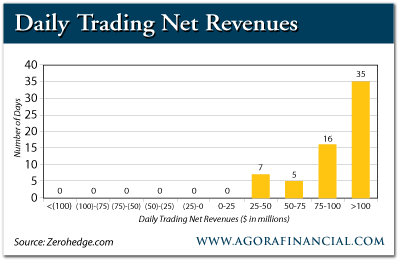Share this ARTICLE with your colleagues on LinkedIn .
Please Note: This Article was simultaneously published in The Global Futurist, The Internationalist Page, and The National Networker RSS and Daily Email Feed Blog. It has been reprinted in full, and appears here with permission. You may re-publish this article at no cost, and without seeking the author's permission provided that you 1) publish the article as it appears here, in its entirety, without editing, or deletion (re-formatting is permissible), and 2) leave all of the illustrations and hyperlinks live and intact. Thank you.
If you wish to join The National Networker Companies' GICBC, receive our publications and be granted access to our unparalleled Suite Of Services for Empowering Emerging Enterprises, Membership is free, and without obligation. Simply click on http://bit.ly/JoinTNNWC .
---------------
Facts, Fiction and Exploitation - Things To Be Concerned About - Douglas Castle
1). If Someone Wins All Of The Time At Any Game Of Chance, The Game May Be Rigged.
2). If Someone Claims To Win All Of The Time At Any Game Of Chance, They May Be Lying.
3). In The Securities Marketplace, A "Greater Fool" (Or Fools) Must Incur Losses for The Purported Winners to Keep Winning -- It is Rather Like A Game Of Musical Chairs...When The Music Stops, Someone No Longer Has A Seat, And Is Stuck With Overpriced And Unsaleable Investments.
4). Big Securities Trading Firms Have Credit -- If They Incur A Positional Loss For One Day, They Don't Have To "Settle Up" With The Bank Until They Have Had An Opportunity To Trade Some More, And Win Back Their Losses (Usually At Somone Else's Expense)... And What If These Large Firms Are Intimately Affiliated With Those Banks? [Conflict Of Interest? Hmmm...]
5). Smaller Investors In The Markets Do Not Have The Credit Facilities To Buy Time To "Set Things Right." They Must Pay For Their Losses Immediately, In the Worst Of Possible Circumstances And Lose Their Holdings In A "Fire Sale" Scenario. Then, They Can Never, Ever Recoup Their Losses. These Losses Become Permanent. Large Trading Firms And Their Bankers Get To Lock In A Profit Because Of Their Obvious Credit Advantage.
Observation A: The Large Banks ("too big to fail!"), The Trading Firms ("slap them on their greedy wrists!"), An Impotent And Often Compromised Government Are Aggressively, And Perhaps Maliciously [Conspiracy? No -- That's Silly Stuff] Bringing The Public To Its Knees.
Observation B: This Is Not Because Of Capitalism. This Is Because Of Encultured, Unpunished, Short-Sighted Greed.
Observation C: Individuals, Entrepreneurs, And Emerging Enterprises Must Act Expediently If They Are Not To Become Enslaved. Cooperation and Collaboration Can Be Used To Rapidly Unite And Grow These "Grassroots" Victims Into A Force With Lobbying Power, Resources And Political Clout.
The above ends my rant. The following article, which was published in The Daily Reckoning, caught my attention:
| Goldman's Perfect Quarter |
| Defying the odds in the "robot combat arena" |
|
 |
| Eric Fry |
Reporting from Laguna Beach, California...
While the European Central Bank (ECB) was busy manipulating markets and making headlines Monday, Goldman Sachs was quietly revealing a different story of market manipulation...or something that walks and quacks very much like a market manipulation duck.
In an SEC filing, Goldman disclosed its first-ever "perfect" quarter. The firm's proprietary trading desk navigated the first quarter without producing a single day of losses, the first time it had accomplished such a feat.
How is this possible? Please permit us to offer a simple explanation: It's not.
Imagine a poker player who competes against skilled competitors for 63 sessions of 6 1/2 hours each, then walks away with a profit after all 63 sessions. Would that be possible? Not unless the poker player is holding a stack of aces up his sleeve. But Goldman accomplished this improbable feat. Its trading desk turned a profit on each and every day of the first quarter - that's 63 trading sessions of 6 1/2 hours each, not counting whatever additional shenanigans Goldman was conducting in foreign markets.
There is something wrong with this picture...very, very wrong. And yet, Goldman trumpets this success as an example of something that is very, very right. "This is the first time we have reported zero trading loss days in a quarter," crowed Samuel Robinson, a Goldman Sachs spokesman. "We believe it shows the strength of our customer franchise and risk management."
An alternative interpretation would attribute Goldman's uncanny trading success to the strength of its "political franchise," subsidized risk- taking and various forms of de facto front-running. If, as James Howard Kunstler asserts, the US stock market has become "a robot combat arena where algorithms battle for supremacy of the feedback loops," Goldman Sachs must control the "Supreme Combat Robot." But we wonder whether this robot is abiding by all applicable securities laws, or vaporizing them with his special "Mega-fraud laser beam."
"If you ever wanted to see what a monopoly looks like in chart form," jokes Tyler Durden from Zero Hedge, "here it is:

|
"The firm did not record a loss of even $0.01 on even one day in the last quarter," Durden says. "The statistic probability of this event is itself statistically undefined. Goldman is now the market - or, in keeping with modern market reality, Goldman is the 'house,' it controls the casino, and always wins. Congratulations America: you now have far, far better odds in Las Vegas that you have making money with your E- Trade account."
In fairness to Goldman, JP Morgan also produced a perfect quarter of proprietary trading. Morgan Stanley, the relative loser in the crowd, managed to produce a trading profit on only 93% of its trading days.
"The rape and pillage of the middle class was not isolated to Goldman," Durden continues. "JP Morgan also had a flawless quarter. And if the odds of Goldman making 63 out of 63 are virtually impossible in any universe in which risk goes hand in hand with return (but in those in which monopolies are encouraged and bailed out), the coincidence of the two main firms that control the world having a perfect track record is impossible. And since things in reality tend to be zero sum, when everyone makes money, someone may be tempted to ask the question, just who is losing money? And the answer, dear taxpayers, and [Goldman/JPMorgan] clients, is you."
Perfection is either a religious virtue or a devilish fraud, dear reader; it is never a financial market reality. So there's something a little troubling about the perfection achieved by Goldman's (and Morgan's) trader-bots. In fact, there might be something a lot troubling about their trader-bots, as well as their investment-bank- atrons.
Perhaps the truth will come to light in the fullness of time...or in the details of a future SEC complaint.
Goldman acknowledged in Monday's SEC filing that it still faces a large and diverse number of criminal and quasi-criminal investigations. In addition to a bevy of investigations by the SEC, Goldman is facing detailed probes by the Justice Department, the Financial Industry Regulatory Authority and the UK's Financial Services Authority related to CDO offerings and related matters.
"We anticipate that additional putative shareholder derivative actions and other litigation may be filed, and regulatory and other investigations and actions [will be] commenced against us with respect to offering of CDOs," Goldman's filing somberly disclosed, "[These probes] could result in collateral consequences to us that may materially adversely affect the manner in which we conduct our businesses."
Hmmm...we'd guess that the list of "collateral consequences" would include reducing Goldman's trading success from 100% to something much lower. And since trading revenues accounted for 80% of Goldman's revenue in the first quarter, we'd guess that much lower net profit will be another "collateral consequence."
####
In my opinion, this article, while more than a bit sardonic in its tone, is dire in its implications. Faithfully, Douglas Castle |
About Douglas Castle
Douglas Castle - LinkedIn Profile
The National Networker Companies
Braintenance - Stay razor sharp.
The Internationalist Page - A world without barriers.
The Global Futurist - Revealing trends.
Taking Command! - Mastering your fate.
LINKS 4 LIFE - Crisis resources.
Follow Castle on Twitter
Follow TNNWC on Twitter
Join Us: Become a Member of the TNNWC Global Interworked Cooperative Business Community (GICBC) at no cost. Click on http://bit.ly/TNNWC
 Labels, Tags and Terms
Labels, Tags and Terms: probability, rigged games, falsehoods, conflicts of interest, the greed factor, taking versus earning, capitalism, Goldman Sachs, cooperation, collaboration, conglomeration.

















No comments:
Post a Comment